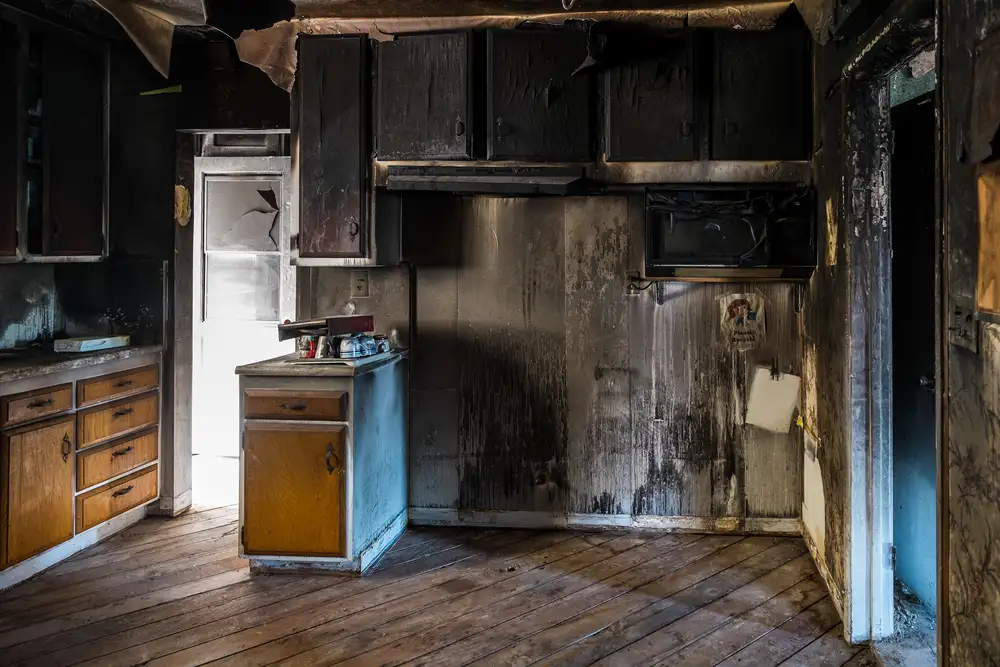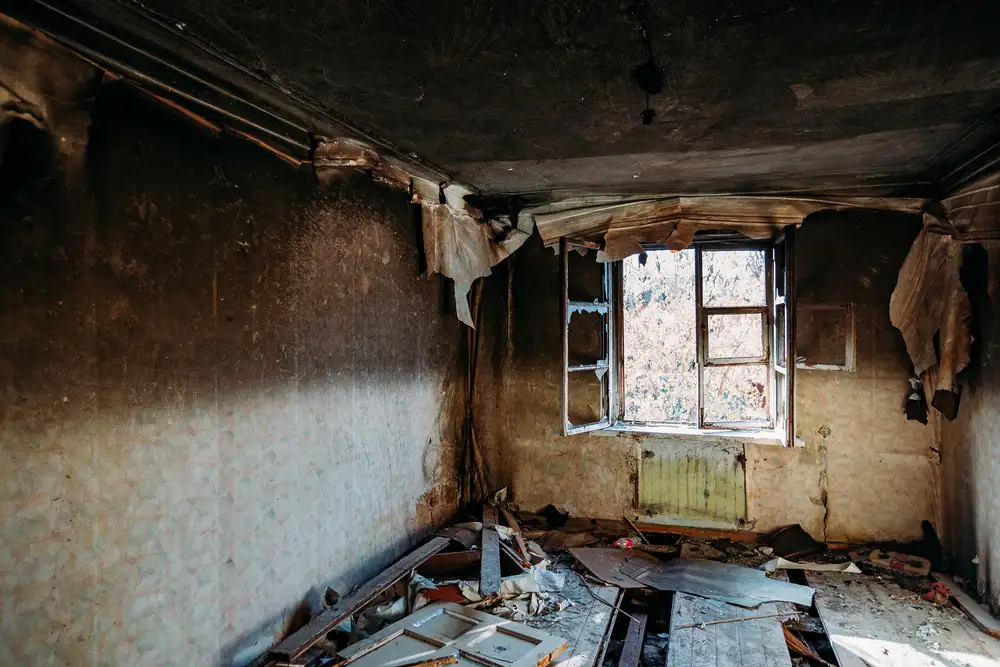Have you ever found yourself thinking “I really need to sell my fire damaged house in Tennessee”. Have you felt overwhelmed by the situation? Fire can devastate a home quickly leaving behind damage that may seem insurmountable. Dealing with the aftermath is not just physically challenging but also emotionally draining, which can make the process of selling your fire-damaged house feel difficult.
How this guide can help you sell your fire-damaged house
This guide is tailored to help turn your uncertainty into confidence. Here you’ll discover strategies and valuable insights specifically crafted for homeowners who are dealing with the challenge of selling a fire damaged house. With these resources, getting a quick sale of your property at a fair price becomes possible.
What you’ll learn in this guide
Whether you’re navigating the decision between cleaning up and repairing or selling the property as is, this guide will offer guidance and support throughout every stage of the process. Here are some crucial insights you’ll learn in this guide:
- Take immediate action after a home fire
- Dealing with insurance challenges
- Finding the right buyers
- Making informed decisions that align with your needs
Despite the challenges posed by fire damage there are still chances to sell your house fast. Lets take this journey together down this road and delve into ways you can move from adversity to achievement.
Immediate Action After a House Fire
After a house fire, it’s important to act fast to minimize damage and begin the recovery process. Here are the steps you should take;
1. Notify your insurance company
The first thing to do is get in touch with your insurance provider. This will kickstart the claims process. Your insurer will provide guidance on what to do next, such as documenting the damage and meeting with an adjuster. They’ll also clarify what your policy covers and excludes when it comes to fire related damages.
Pro Tip: Keep a record of all communications with your insurance company. This can prove invaluable later on, particularly if any disputes arise regarding your claim.
2. Contact your utility providers
Next, contact your utility companies to have services like gas, electricity, and water disconnected. This step helps prevent safety risks like gas leaks or electrical incidents. It’s also wise to inform them about the fire so they can adjust your bills accordingly.
3. Seek help from disaster relief organizations
Lastly don’t hesitate to seek assistance from disaster relief groups. These organizations provide support for necessities like food, clothing, and other essentials after a house fire. During difficult times in Tennessee, groups such as the American Red Cross and United Way stand prepared to offer help.
Facing a house fire can be overwhelming and difficult. However, following these guidelines can offer guidance amid the turmoil setting the stage for selling your fire damaged home in Tennessee down the line.
Understanding Fire Damage and Its Impact on Property Value
Experiencing a house fire can be terrible. And understanding the extent of the damage is crucial. Fire damage goes beyond the areas directly impacted by flames. It spreads throughout the property impacting its value and potential for resale.
What is Fire Damage?
Fire damage includes both visible and hidden issues that arise from a fire incident. Here are some key elements to take into account:
- Visible Damage: This includes charred walls, melted plastic, and destroyed furniture – clear signs a fire occured.
- Hidden Damage: Structural damage, weakened foundations, and damaged electrical systems are examples of problems that can be impacted by fire damage. These issues may not be immediately noticeable, but can lead to problems in the future.
The Impact of Smoke Damage
The aftermath of a fire doesn’t conclude with burnt belongings and structural challenges. Smoke damage plays a role well. Smoke has the ability to get in to every corner of your home leaving behind soot and a distinct odor that can be difficult to get rid of. This smoke related damage can greatly diminish your property’s appeal in the market because if not properly addressed during repairs, the smell of smoke may persist and discourage buyers.
This highlights the importance of remediation efforts. Effective removal of smoke odors often requires special tools and expertise. Investing in smoke remediation may seem expensive at first, but it can greatly improve the attractiveness of your home to potential buyers.
Now that we’ve covered what constitutes fire and smoke damage lets turn our attention to how these elements impact the value of your property.
How Fire and Smoke Damage Affects Property Value
When you file a claim for fire damage with your insurance provider, an adjuster will come to your property to evaluate the damage. They inspect everything – from visible damage to hidden issues like smoke damage in walls or water damage from cleanup efforts.
Their assessment significantly influences the valuation of your property after a fire. The adjusters report will detail the repair or replacement costs, which directly affect how much you can demand when selling your home.
By understanding the scope of fire and smoke damage, and how adjusters assess these aspects you can navigate the sale process of your fire damaged home in Tennessee effectively. With this knowledge in hand, you can make informed choices to maximize the selling price of your property.

5 Steps To Selling A House With Fire Damage As-Is
Selling a house with fire damage as-is might seem overwhelming. However, it can actually be a practical choice that saves you time, money, and hassle. Rather than dealing with the repairs yourself, you can let the buyer handle them while you focus on moving to your new home.
Why Selling As-Is is a Good Option
- Save time and effort: Opting to sell as is allows you to bypass the process of fixing up your fire-damaged property.
- Avoid repair costs: Fire damage repairs can be expensive. Selling the house as is means you won’t have to take on those costs.
- Reduce stress: Coping with the aftermath of a fire can be stressful. Selling as is shifts the burden of restoration to someone else.
The Importance of Honesty in Selling a Fire-Damaged House
Being honest is crucial when selling a fire-damaged property. Fully disclosing the fire damage to buyers is not only ethical but a legal obligation. Withholding information about damages could lead to issues in the future. It’s important to be clear about:
- The extent of the fire damage
- Any problems related to smoke
- Whether any repairs or remediation efforts have been made
How Professionals Can Help
Navigating the sale of a property damaged by fire can be unfamiliar for homeowners. This is where seeking advice from experts becomes valuable. Real estate agents experienced in selling fire-damaged properties understand the hurdles you may encounter and can provide guidance throughout the process.
There are also cash home buyers like Nexus Homebuyers who buy houses for cash and can give you a fair cash offer on your fire-damaged home. They can even cover closing costs. Unlike realtors, you don’t have to pay commissions when working with a cash home buyer. Nexus Homebuyers are trusted local cash home buyers in Tennessee who have been buying fire-damaged homes since 2017.
Now, let’s dive into the steps you need to take when selling your house as-is after fire damage.
Step 1: Evaluating the Condition of Your Fire-Damaged House
When dealing with a fire-damaged house, the first step is to evaluate its condition. This involves a detailed assessment to uncover both visible and hidden damages.
Uncovering Hidden Damages
To properly evaluate your fire-damaged house, you’ll need to do more than just look at the surface. Fire can cause damage that extends beyond what meets the eye:
- It can affect the structure of your house, including walls, ceilings, and floors.
- Electrical systems may be compromised due to heat or water damage.
- Plumbing might be affected if pipes were exposed to high temperatures.
- Smoke and soot can find their way into different areas of your home, leading to further harm.
Understanding the full extent of the damage is crucial as it will guide your decision-making process moving forward.
To Repair or Not to Repair?
Once you have a clear picture of the damage, you’ll need to decide whether you want to repair the house or sell it as-is. Several factors can influence this decision:
- Your budget: Repairs can be costly, so it’s important to consider if you have enough funds set aside for them.
- Time constraints: If you need to sell your house quickly, investing time in repairs may not be feasible.
- Market conditions: Assessing the demand for houses in your area can help determine if selling as-is is a viable option.
If you choose to repair the house:
- Focus on cost-effective strategies that improve its overall appeal.
- Prioritize repairs in visible areas and those that directly impact functionality.
- Consider making cosmetic improvements as they can significantly enhance perceived value without breaking the bank.
On the other hand, selling your house in its current condition can save you from dealing with extensive repairs. Carefully weigh the pros and cons before making a decision.
Finding Reputable Contractors for Fire and Smoke Damage Repair
In case you opt to repair your home, it’s essential to find trustworthy contractors who specialize in fire damage restoration and smoke damage repair. These professionals have the expertise needed to restore your house effectively while minimizing further risks.
To find reputable contractors, follow these steps:
- Ask for references from people who have faced a similar situation.
- Check online reviews and ratings of local contractors.
- Shortlist potential contractors and request detailed cost estimates from each.
- Have discussions about the scope of work and the expected timeline for completion.
- Verify that they are licensed, insured, and adhere to safety protocols.
Remember, the goal is not just to fix the damage but also to ensure that your house is safe and livable. Taking a comprehensive approach will increase your chances of selling the property at the best possible price.
During this challenging process, keep in mind that companies like Nexus Homebuyers are available to offer assistance. They specialize in purchasing houses quickly and in any condition, providing a convenient alternative to traditional methods of selling a home.
Step 2: Navigating Insurance Coverage Challenges
When dealing with the aftermath of fire damage to your Tennessee home, it’s important to understand how insurance coverage works. There are two main types of insurance that are relevant in this situation:
- Dwelling coverage: This part of your homeowner’s insurance policy helps pay for repairs to the structure of your house, such as walls and roofs.
- Personal property coverage: This aspect covers the costs to replace furniture, clothing, and other items inside your home.
To make sure you’re prepared, here are some steps you can take:
- Review your policy thoroughly to determine what is covered and to what extent. Keep in mind that certain items may be subject to limits or exclusions.
- Understand the potential challenges you might face when filing a claim for a fire-damaged house, such as claim denials or underpaid settlements.
- Learn how to navigate these hurdles effectively by following the tips below.
Dealing with Insurance Companies
When filing a claim for a fire-damaged house, you might face several challenges:
- Claim denials: Insurance companies might deny claims if they believe the damage was preventable or due to homeowner negligence.
- Underpaid settlements: You could receive a settlement offer that doesn’t fully cover the cost of repairs or replacement.
To navigate these hurdles effectively, consider the following steps:
- Document everything: Take extensive photos and videos of all damages immediately after the fire. List every item damaged or lost and estimate its value.
- File promptly: Notify your insurer as soon as possible to initiate the claims process. Delay can complicate matters.
- Keep detailed records: Maintain a log of all communications with your insurance company. Include dates, names, and summaries of conversations.
- Review your policy: Understand what is covered under your policy and what is not. Check for any specific requirements or stipulations regarding fire damage.
- Get repair estimates: Obtain quotes from contractors for the repair work to provide evidence of the costs involved in restoring your property.
- Stand firm: If you’re faced with an unsatisfactory settlement offer, don’t hesitate to negotiate with your insurer for a fair outcome.
The Role of Public Adjusters and Attorneys
Sometimes, it’s prudent to bring in additional expertise:
- A public adjuster specializes in handling insurance claims on behalf of policyholders. They can assess the damage, estimate repair costs, and negotiate with insurance companies.
- An insurance attorney can be invaluable if legal action becomes necessary due to disputes with your insurer.
Both professionals operate independently from insurance companies and work in your best interest.
In essence, successfully navigating insurance coverage challenges requires diligence, attention to detail, and sometimes professional support. By taking these proactive steps, you enhance your prospects for receiving adequate compensation to mend or sell your fire-damaged home at a fair price.

Step 3: Attracting Buyers for Your Fire-Damaged House
When you are trying to sell a house that was damaged by fire, finding a buyer who can look past the damage and see its potential is essential. Historically these buyers are individuals who specialize in renovating properties. They are able to turn a “fixer-upper” or other distressed property into something of real value. In this section of the article, we shall offer some effective marketing strategies and tips on finding the right real estate agent to pull off such a feat.
Marketing Strategies to Highlight Potential
In order to attract buyers who can visualize what your fire-damaged property might turn into, here are a few suggestions:
- Showcase Transformation Opportunities: Share photographs of similar homes that have been successfully renovated. These transformation examples will give potential buyers a visual basis for seeing the potential in your own fire-damaged property.
- Emphasize Unique Features: If your property has any special features such as being in a prime location, a large lot, or unusual architectural detailing, be sure you highlight all these special virtues when you advertise it.
- Create Compelling Descriptions: When writing property listings, concentrate on the possibilities rather than the house’s current condition. Use words to create an image of what this property could be like with a little investment and imagination.
- Utilize Various Platforms: Post your fire-damaged house on websites and forums that cater to investors and house flippers. These include real estate investor forums, social media groups devoted to home renovation, and online venues such as eBay.
Partnering with an Experienced Real Estate Agent
Working with a real estate agent who has experience selling distressed properties can be extremely helpful in finding the right buyer for your fire-damaged house. Here are some things to look for when selecting a real estate agent:
- You want agents who have successfully completed sales of fire-damaged or otherwise distressed homes. Their expertise in this niche market can give you a big advantage.
- Find an agent who is experienced in marketing properties that need repairs or improvements. Someone with novel methods of reaching potential buyers interested in such kinds of homes.
- Ask for their contacts. A seasoned agent will have relationships with private capital investors and contractors who are specifically seeking out fire-damaged homes to buy.
- Choose somebody who communicates openly and honestly with you. There are particular challenges that come with selling a fire-damaged house, so you need someone who can help manage your expectations and is explanatory about the process you will undergo.
- They charge commissions. Nothing is ever free or even cheap, especially when it comes to real estate representation because most people charge 2-3% as listing agent and then 3% more if there’s another agent involved on the buyer’s side too cutting deeply into the amount going into your pocket.
Through careful marketing and working with an experienced realtor, you can increase the likelihood of finding a buyer for your fire-damaged house. This method makes it possible to locate opportunities where others may see only difficulties, which turns what seems like one problem into a successful sale.
Step 4: Setting the Right Price
This is a complex problem because for fire-damaged houses, the value is a question of the house’s current state versus its future ARV(after-repair value). By looking at strategies such as these, you can set a price that is both competitive and fair.
Do Your Homework
Keeping track of Tennessee real estate market trends can provide useful points. The pertinent information you get will be the sales prices for similar properties in your area. Studies that compare houses with comparable fire damage and their final sales price. This will give you a benchmark with which to begin your pricing.
Speak to Professionals
Professional appraisers can provide an objective opinion of the value of your house based on what it could potentially bring without repairs.
You may be able to make more money by turning to people who buy houses not based on what they look like–but as fire-damaged investments. Nexus Homebuyers, for instance, are cash buyers specializing in purchasing houses in any condition. They have an appreciation for the after repair value and can help buy your property without going through the listing process.
Find the ARV
Pricing a fire-damaged home is determined by the after-repair value. The ARV is the figure that your property could perhaps achieve after it is restored and then sold on the market. Knowing this number will allow you to price your house right.
Furthermore, offering diverse sources of financing might prove crucial in attracting potential buyers for your fire-damaged house.
Offer Financing Options
The traditional route of bank funding is not always possible or palatable to buyers eyeing fire-damaged properties- perceived risk and interest rates may be higher.
Therefore, offering alternative financing options could open the door to selling your home with a fire-damaged house faster.
Seller financing: Under this plan, the seller serves as the lender. As the buyer, you pay a mutually agreed sum in advance and then make regular payments directly to the person who sold it to you until the purchase price has been paid off.
Renovation Loans: These are loans that buyers can use to purchase a property and then cover the cost of repairs. The FHA 203(k) loan is a well-known example that combines both the acquisition of a home and renovations onto one mortgage.
By setting an attractive price for your fire-damaged house, making sure you’re fully aware of its true value and potential, and offering flexible financing terms, you’ll be in the strongest possible position to get the best possible sale. The final step? Closing the sale- that’s our next topic in depth.
Step 5: Disclosing Fire Damage and Managing Buyer Concerns
After a fire leaves a house damaged, Tennessee state requires vital information must be disclosed to the buyer. As you prepare to list your burned house for sale, here are some key considerations regarding property disclosure and addressing buyer concerns.
Legal Obligations for Disclosure
There is a legal burden on the seller that they are to inform prospective buyers of all material defects. Certainly, that also includes fire damage. To meet this obligation:
- Make a comprehensive disclosure statement: Document all known fire-related issues in a clear, detailed written statement.
- Include the disclosure in the purchase agreement: This way it goes on record as an integrated part of the deal, both in order to indicate and confirm adherence from everyone involved.
In doing so you not only avoid future legal entanglement but also provide potential buyers with assurance they can move forward.
Addressing Buyer Concerns Head-On
When buyers express reservations regarding a fire-damaged house, it’s crucial to address these right away:
- Provide Documentation of Repairs: Present buyers with receipts, warranties and even inspection reports for any work carried out post-fire. This shows the work was done in a professional manner and to certain standards.
- Offer Extended Warranties: To provide buyers with even more assurance, consider giving them longer warranties on the workmanship or new systems that were put in because of the fire. This can substantially ease concerns about future problems resulting from past damages.
- Be Ready with Answers: Think ahead about questions the buyers might ask regarding the fire — its cause, extent, effect on the building structure, and so forth — prepare to be factual and provide accurate answers. Honesty is the best policy; if there are problem areas that have not been taken care of yet, reveal them openly.
- Highlight Any Upgrades: Often after a fire, properties undergo substantial upgrades. Note any improvements that have been or are being made during the repair process as these may well increase a home’s desirability and value.
In doing this, you show determination to solve potential problems from the outset; and sincerity in your efforts to attract buyers. Actions such as these can significantly how a property is perceived, moving it from being considered simply as fire-damaged into one where extra protection and amenities.
Restoring a fire-damaged house in the past doesn’t have to mean reducing your profit. Instead, it’s all about accurately presenting the history of your property and where it currently stands, in order to entice buyers. By dealing with buyer concerns efficiently, you lay the groundwork for a successful sale where both parties are happy in the end.
Conclusion
If you’re feeling stressed about selling a fire-damaged house, just know it is possible. You can sell a house with fire damage in Tennessee. This guide shows homeowners how to navigate the complexities of such a sale.
Remember these pivotal steps:
- Immediate Measures: Immediately notifying both your insurance company and local utility providers lays the groundwork for recovery.
- Damage Assessment: A comprehensive understanding of fire damage and how it will affect your property’s value is key to getting back to normal.
- Selling As-Is: If you decide to market your fire-damaged home as-is, it may save both time and money. As long as you disclose all damages that potential buyers would be interested in knowing about.
- Professional Assistance: Advice is available from experts who have experience with fire-damaged houses. They can steer you toward a more beneficial sale.
Using this information, homeowners can effectively shape buyer expectations while also leading them up the path to the highest possible price for their fire-damaged property.
As you employ what you have learned in this guide, each step taken to remedy and disclose fire damage brings you closer to the day when your home can be sold. The journey from a fire-damaged home to a new residence might appear difficult, but success is entirely possible through right conduct.
Remember this advice well as you go about selling your fire-damaged house.
Frequently Asked Questions About Selling a Fire-Damaged House
1. Can I sell my house with fire damage without repairing it?
Yes, you can sell an unrepaired fire-damaged house. There are, however, several considerations which may impact either your selling process or the ultimate price of sale:
- Buyer Perception: Because a house that has been damaged by fire tends to look run down, appropriate buyers are usually restricted to those looking for renovation projects or investors.
- Pricing Considerations: The sale price for an unrenovated fire-damaged house is almost certain to be lower than market value. You must set a price that covers the cost of repairs and make sure it is still attractive to buyers.
- Disclosure Requirements: Honesty is crucial. To avoid legal wrangles with your buyers later, you must make full disclosure about the extent of the fire damage suffered by your property.
- Financial Incentives: Some buyers may think the chances of making a profit are good if they renovate the property themselves following fire damage.
- Insurance Claims: If you have an outstanding insurance claim, it can obstruct your sale. People may not want to buy for example, as they are unsure what the claim outcomes will be or how big future liabilities are going to turn out.
When considering a sale of your un-renovated fire-damaged house, balancing these issues against your need for a fast sale is essential. Selling “as is” might be a good option if you don’t want to cope with repairs or are looking for quick results.
Bear in mind also that investors or home-buying companies like Nexus Homebuyers are often interested in properties like yours. They understand the value beneath the damage and may offer fair prices reflecting both its present condition and what it would be worth to them once repaired.
This route might simplify your sale process, freeing you faster from something that has admittedly been a nightmare. With clear communication, you can sell your fire-damaged home in Tennessee fast.
2. How to Determine If Your Fire-Damaged House Can Be Insured
If you’re selling a house damaged by fire, it is essential to know whether it can still be insured. Underwriters make judgments about the risks and decide whether or not to cover property by fire.
What follows are the criteria that underwriters look at:
- The fire damage in general
- The success of the repair work and restoration effort
- Chances that a like event might happen again
To check whether your house can be insured, you can try this:
- Call Your Existing Insurance Company: Begin by contacting your current insurance agent. Describe what happened and notify the agent that you plan to sell the premises. The insurance company may inform you about any potential coverage options or restrictions based on your present policy.
- Order an Outside Appraisal: Engage a reputable appraiser or home inspector to assess the property independently. Their evaluation could offer a sunnier view of the fire damage, influencing an underwriter’s decision.
- Turn to Other Insurers: Don’t give up hope if your present insurer refuses to insure the property. There are other companies that specialize in high-risk or non-standard coverage and may be eager to take such risks.
It can be overwhelming to sell a fire-damaged house that has not been restored, but knowing whether it can be insured helps make matters simpler.
Keep in mind that each person’s situation is unique. What suits one homeowner may not work for another, so it is important to consider all available options in case problems arise.
3. Should I Hire a Real Estate Agent or Sell My Fire-Damaged House on My Own?
When selling an unrestored fire-damaged house, making a decision whether to employ a real estate agent or work solely through For Sale By Owner (FSBO) relies on a number of variables.
Real Estate Agents:
Perhaps it’s because they bring expertise, negotiation skills, and marketing resources to the table. With their deep market knowledge of the Tennessee area in which you live, these agents understand all aspects of selling a fire-damaged property.
- Expertise: Real estate agents understand both government and local laws and regulations about selling fire-damaged properties. They know how to fulfill these requirements and will even guide you through the process.
- Negotiation Skills: When you have an experienced agent who is adept at negotiating, they can help swing the best possible price for your home.
- Marketing Resources: Realtors can take advantage of multiple listing services and other platforms to expose your property to a broader audience.
However, this comes at a price — usually a commission based on the final sale price.
For Sale By Owner (FSBO):
Alternatively, selling your house on your own allows you to bypass the agent’s commission. This could save you thousands on closing day.
- Control: For Sale By Owner gives you complete control of every aspect of the sale.
- Potential Savings: By handing the sale yourself, there are no real estate agent commissions – except to the buyer’s agent.
But remember, FBO means taking on all the tasks — from marketing your property to negotiating with buyers and handling all of that paperwork.
It is very important to weigh these pros and cons carefully before deciding whether to hire an agent or go it alone with a FSBO. Consider your comfort level with negotiations, availability for managing viewings and inquiries about a viewing time, knowledge of real estate transactions, among other factors. You want to make a good decision that fits well with your unique situations.
Remember, there’s no right or wrong answer – just the answer that works best for your situation.
4. What are some common challenges that arise when selling a fire-damaged house?
Selling a house with fire damage presents its own unique set of problems. Here are some of the most common challenges when selling a fire-damaged house:
1. Limited Buyer Pool: Fire damage can limit the pool of potential buyers for your property. Many buyers may not want to take on the task of fixing up a fire-damaged house.
2. Negative Perceptions: A fire-damaged property might carry negative perceptions, turning away potential buyers who may associate it with bad luck or the fear of hidden damages.
3. Financing Difficulties: Financing a fire-damaged property is difficult. Obtaining loans for homes in that kind of condition used to be fairly simple before 1965, but now there are several hurdles and challenges if not outright barriers to lending homeowners money to fix up such properties.
Remember, while selling a fire-damaged house may seem daunting, understanding these challenges can help you navigate the process and make informed decisions.
5. Are there any specific regulations or restrictions I need to be aware of in Tennessee when selling a fire-damaged house?
Those who sell a fire-damaged house need to follow certain laws. Buyers have state-wide legislation and local rules in Tennessee areas. This is especially important if you are trying to sell an un-repaired fire-damaged property.
Here are some key things you should know:
Disclosure Laws
Sellers need to complete a Residential Property Disclosure Statement. They need to reveal anything they know is wrong with the place, including but not limited to whether any previous fires had occurred and how much damage was done.
As-Is Sales
If you are thinking of selling your house “as is”, it should be noted that this will not exempt you from disclosure requirements. Even in as-is sales, full disclosure about the condition of the home is mandatory.
Municipal Codes
Local ordinances may have specific requirements about safety and habitability standards for homes affected by fires.
This is only the tip of the iceberg as far as what homeowners may face while attempting to sell off a Tennessee home afflicted with fire damage. It is best advised consulting a real estate professional or legal adviser to ensure compliance with all relevant regulations.
Remember, knowledge is power. With knowledge acquired from this article plus familiarization with these processes, the path to a successful sale of a fire-damaged house will not be as daunting and unsafe!
Helpful Links for Fire Damage in Tennessee
If you want to minimize the damage done by a fire in your house, the right tools are essential. But some things can always come in handy – like these local and web-based resources:
1. Your Local Fire Department
Your local fire department provides valuable information on fire safety, prevention, and recovery. They provide useful guides and materials that help people learn how to safeguard their homes from fire and what to do should the worst ever happen.
2. Nexus Homebuyers
For homeowners who would like to sell their fire-damaged homes quickly, conveniently, and without hassle, a reputable home-buying company, such as Nexus Homebuyers may offer just the solution. they buy houses fast in any condition and can close on your schedule.
As always, it is essential to stay informed and active when dealing with fire damage in your home. The more you know about your options and resources available in Tennessee, the better you will be positioned to successfully navigate these challenges.
3. Tennessee Building Inspections – Fire Damage Permits and Regulations
After a fire incident, homeowners in Tennessee are advised to visit their local permitting office for guidance on obtaining permits for fire damage repairs. Ensuring compliance with the local building codes and regulations is crucial for both safety and legal reasons.
Here, you can access information about:
- Fire Damage Permits: Get an understanding of when these permits are needed and how to apply for one.
- Building Regulations: Learn about the specific rules and requirements around fire damage repair in Tennessee.
- Inspection Process: Gain insight into what happens during a fire damage inspection.
Individuals involved in the rebuilding process after a fire could find it confusing to say the least. Go to your local building inspection department and learn what you need to sell your fire-damaged home quickly and profitably.
4. Tennessee Insurance Agency
After fire damage has become a reality in Tennessee, local homeowners can go to local area insurance companies that specialize in fire damage coverage:
- Your Local Fire Department: For immediate assistance and fire prevention resources.
- Local Insurance Agencies: These agencies provide specialized coverage for fire-damaged properties and can guide you through the claims process.
- Fire Damage Resources: Seek out comprehensive guides and materials on handling fire damage insurance claims.
For a deeper dive into managing your fire-damaged property in Tennessee and navigating insurance intricacies, consider these resources:
- Tennessee State Fire Marshal’s Office (SFMO): The SFMO provides comprehensive resources and guidelines for fire prevention, including seasonal tips, smoke alarm programs, and information on fire safety standards for homes. Homeowners can access community fire prevention programs and guidelines tailored for Tennessee.
- Tennessee Department of Agriculture’s Division of Forestry – Wildfire Prevention
This resource offers specific information on wildfire risk reduction, which is especially valuable for rural homeowners. Programs include wildfire prevention tips, safe burning practices, and resources for property fireproofing in high-risk areas. - National Fire Protection Association (NFPA) – Home Fire Safety
While not exclusive to Tennessee, the NFPA provides general fire prevention resources that are valuable for all homeowners. This includes guides on home escape plans, smoke alarm maintenance, and cooking safety. They also provide tips for specific fire risks, such as those associated with heating and electrical systems.
With the help of these resources, you will learn how to protect your property. You will also be better able to achieve good results in an insurance claim as a result.





